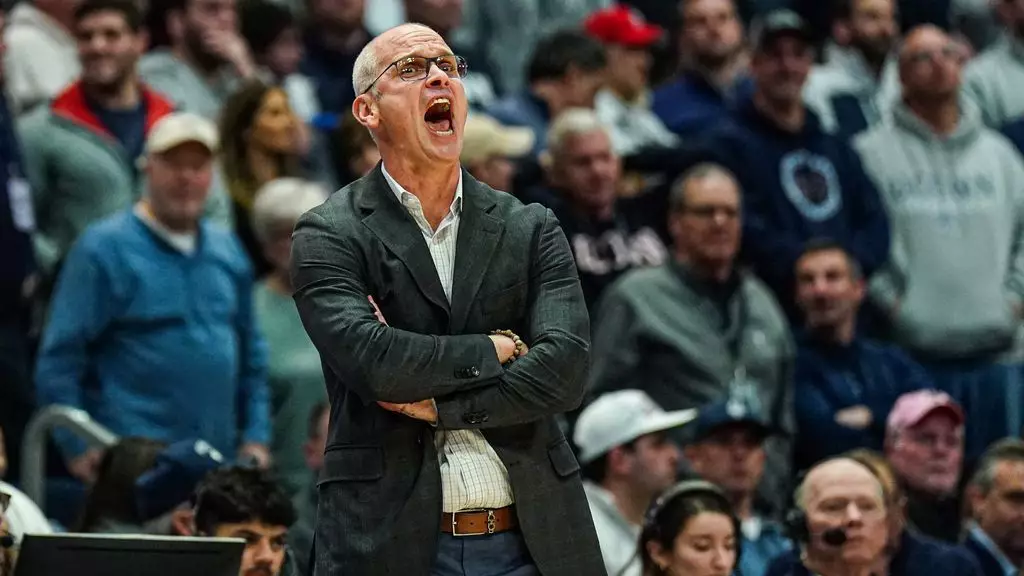In the realm of competitive sports, particularly in college basketball, emotions run high. For UConn coach Dan Hurley, a loss in the NCAA tournament can elicit reactions that are every bit as intense as the game itself. Following the recent defeat against Florida, which marked the end of an impressive three-year championship streak, Hurley found himself embroiled in controversy due to some ill-advised comments regarding officiating. A slip of the tongue, some might call it; however, this incident is indicative of a larger issue that transcends the immediate frustration of a disappointing game.
In the immediate aftermath of the game, Hurley’s harsh words captured on camera—expressing disdain towards possession of officiating—are a reflection of the psychological toll coaching can impose. While it’s easy to dismiss such comments as mere heat-of-the-moment frustrations, they underscore a worrying trend among coaches who often allow their competitive spirit to morph into hostility. Hurley’s comments, aimed at the referees and captured in an unsettling manner, not only tarnish his reputation but also risk fostering a culture of aggression in collegiate sports.
The Consequences of Passionate Coaching
Hurley’s subsequent reflection on his comments reveals a level of regret, but there’s a disturbing duality in his acknowledgment. On one hand, he admits he let emotions control his actions; on the other, he justifies them with the intensity he brings to the game. For dedicated fans and aspiring players, it raises an important question: where should the line be drawn? Is it acceptable for coaches to express justified anger, or does it contribute to a toxic atmosphere that ultimately harms the players they aim to mentor?
Despite his fiery reputation, Hurley’s candid admission of regret reiterates that emotional outbursts are detrimental not just to personal credibility but to the integrity of the sport itself. When coaches engage in this manner, they risk setting a negative example for young athletes who look up to them. Trapped in an environment of heightened emotions, one wonders if Hurley’s behavior is indicative of a broader culture, an acceptance of outrage in sports where passionate engagement has morphed into something uglier.
Reflections on Accountability and Leadership
To say that Hurley’s incident was an isolated occurrence would be to overlook the pattern that has emerged throughout the season. From pre-game tirades against referees to unsportsmanlike behaviors towards fans, his actions raise serious questions about accountability. In a world that demands responsibility from players for their conduct, should not the same scrutiny be applied to coaches?
The leadership in collegiate sports isn’t just about tactical brilliance; it’s about educating young minds. Coaches have the duty to model behavior that embodies respect and dignity. Hurley’s defense of his actions—asserting that those comments were justified by the stakes of the game—leaves much to be desired in terms of accountability. Reflecting on these instances, one cannot help but wonder how much of this behavior is tolerated because it is framed as “passion.” In reality, if unchecked, such passions can spiral out of control and lead to a pervasive culture of hostility.
Moving Forward: The Call for More Thoughtful Leadership
As Hurley considers the steps to amend his approach, it seems an essential opportunity has arisen for both him and the basketball community: a chance to redefine what passionate coaching looks like. It’s not enough to merely express regret; genuine change requires an introspective look at one’s role as a mentor. It demands an understanding that emotional integrity is a critical component of integrity in sports altogether.
This episode may serve as a cautionary tale not just for Hurley, but for coaches across the spectrum. The future of college sports is at a crossroads, and transforming the competitive fire into something constructive can help foster a healthier environment for everyone involved. Coaches can assert their passion and dedication without alienating or belittling others within the sports landscape—an ethos that must underpin collegiate athletics. The price of losing one’s temper can extend far beyond a singular moment, potentially jeopardizing the fabric of sportsmanship itself. Ultimately, the call for thoughtful leadership resonates loudly; it is time for the passion of coaching to manifest in ways that uplift rather than undermine.

